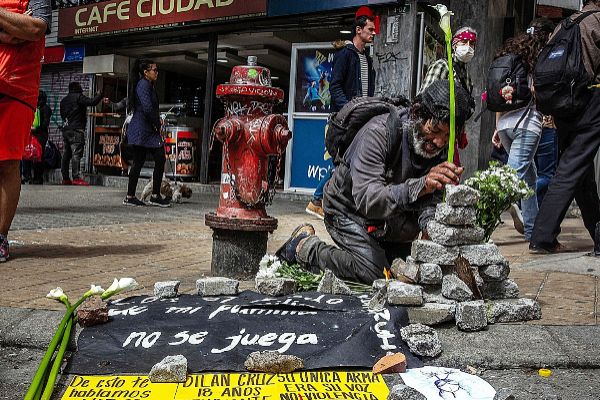- Bogotá.Muere Dylan Cruz, the young man injured by the police and symbol of the protests in Colombia
- Colombia.Duque calls the "national dialogue" to stop the protests
In a polarized and uncertain panorama, with stoppages and demonstrations that the Government tries to contain with dialogue to several bands and express social measures, the death of the student become a symbol of the protest sharpened the tension and heated the street.
Dylan Cruz , 18, died on Monday night (early morning on the Peninsula), at the San Ignacio hospital in Bogotá, where he had been admitted since Saturday. That day he was injured by a shotgun shot by a policeman , who was removed from the institution for what happened.
The Military Criminal Justice and the Attorney General's Office investigate what happened in order to determine responsibilities, and there are voices that demand exemplary punishment for the agent and his superiors. What is known so far is that ESMAD (riot police) intended to dissolve a peaceful march of hundreds of students and an officer fired a shotgun with pellets, one of its endowment weapons, and struck Dylan in the head.
It embodied the young man of unstructured family without horizons. From an unknown father and mother imprisoned in Cali, he lived in Bogotá with his two sisters, 21 and 16 years old. He stayed more than a year and a half at the Hogares Claret Foundation, "a therapeutic community, due to behavioral problems," explained José Luis Perales , a former partner to the local FM station of RCN.
Who acted as head of household was the older sister, Denis, who went to Dylan's high school graduation ceremony on Monday morning. In the school he pronounced a few words, showing a maturity that has lacked some opposition leaders these days, who were tempted to instrumentalize the tragedy.
"We want that what happened with Dylan is not for more disturbances, we want this to be a trigger to end the violence, with everything bad that happens in the country," he said. "We ask for peace. He fought for his rights."
As anticipated, the death caused new concentrations and protests in several Colombian cities throughout Tuesday, most of them without serious incidents so far.
Hours earlier, the National Unemployment Committee, composed of about twenty trade union and social organizations, held a first meeting with Iván Duque at Casa Nariño. They had made it clear, in any case, that citizen mobilizations will not cease throughout the country until they achieve their objectives. The problem facing the Executive is to satisfy the range of claims they presented, regardless of the proposals of the common people who want direct dialogue with the president.
In its broad statement of petitions, the Committee claims, first of all, the dissolution of ESMAD and debugging the National Police. On the economic level, withdraw the tax reform bill, do not present the labor or pension reform, do not privatize any public company, fulfill the commitments that the government of Juan Manuel Santos acquired with students, indigenous people, teachers, among others . Also, define environmental policies that prevent, for example, fracking and much more.
The 'Duke Administration', meanwhile, designed three types of "national conversations" that will go until March 15 of next year: meeting with citizens, with different social , political and economic sectors , and with regions . They will address six major axes of discussion, starting with corruption to continue with education, peace with legality, environment, strengthening of institutions and growth with equity.
In sum, the protests, which resulted in serious acts of violence, managed to change the political agenda and leave the country in limbo while agreeing on some points. And like Sebastián Piñera did in Chile to calm down, Duque announced on Tuesday a package of immediate measures, such as returning VAT to 20% of the poorest population and incentives for youth employment.
It will not be easy for him to calm the agitated waters, given the distance between his ends and those of the aforementioned Committee, which without waiting for results has already called for a new strike for Wednesday.
"A Molotov cocktail is being built that will explode us all, and more with the disinformation in social networks," conservative congressman José Jaime Uscástegui told EL MUNDO. "The opposition parties do not realize that the cacerolazo and the marches are not only against the Government, but against the whole State. It is a clumsiness and a myopia that, in the face of that time bomb, feeds hatred against the system to get political revenues. "
The violence experienced in the streets, although far from the Chilean, is reflected in what was suffered by the journalists who covered the demonstrations. "We have seen record figures of attacks against the press. In 2013, in the agricultural strike that lasted 75 days, there were 24 cases. Now, in just three days, we reached that same figure," Luisa Fernanda Isaza , coordinator, told this newspaper of Defense and attention to journalists of the FLIP (Foundation for press freedom). "The main aggressor has been the police, followed by the hooded. There is a climate of fear and polarization that social networks amplify."
According to the criteria of The Trust Project
Know more- Sebastian Piñera
- Juan Manuel Santos
- Chile
Latin America Social measures do not stop violence in Chile
Latin America Colombia catches the wave of protests in Chile and Ecuador
Protests The historic agreement on the Constitution fails to stop protests in Chile

